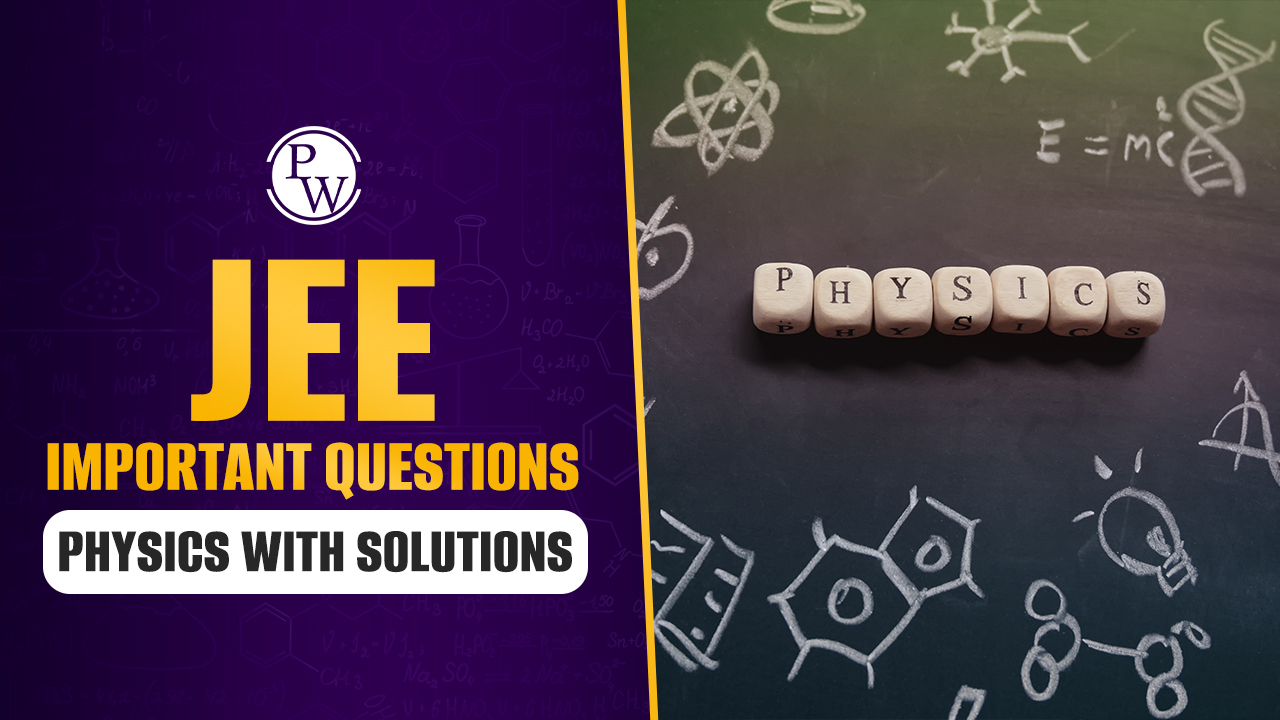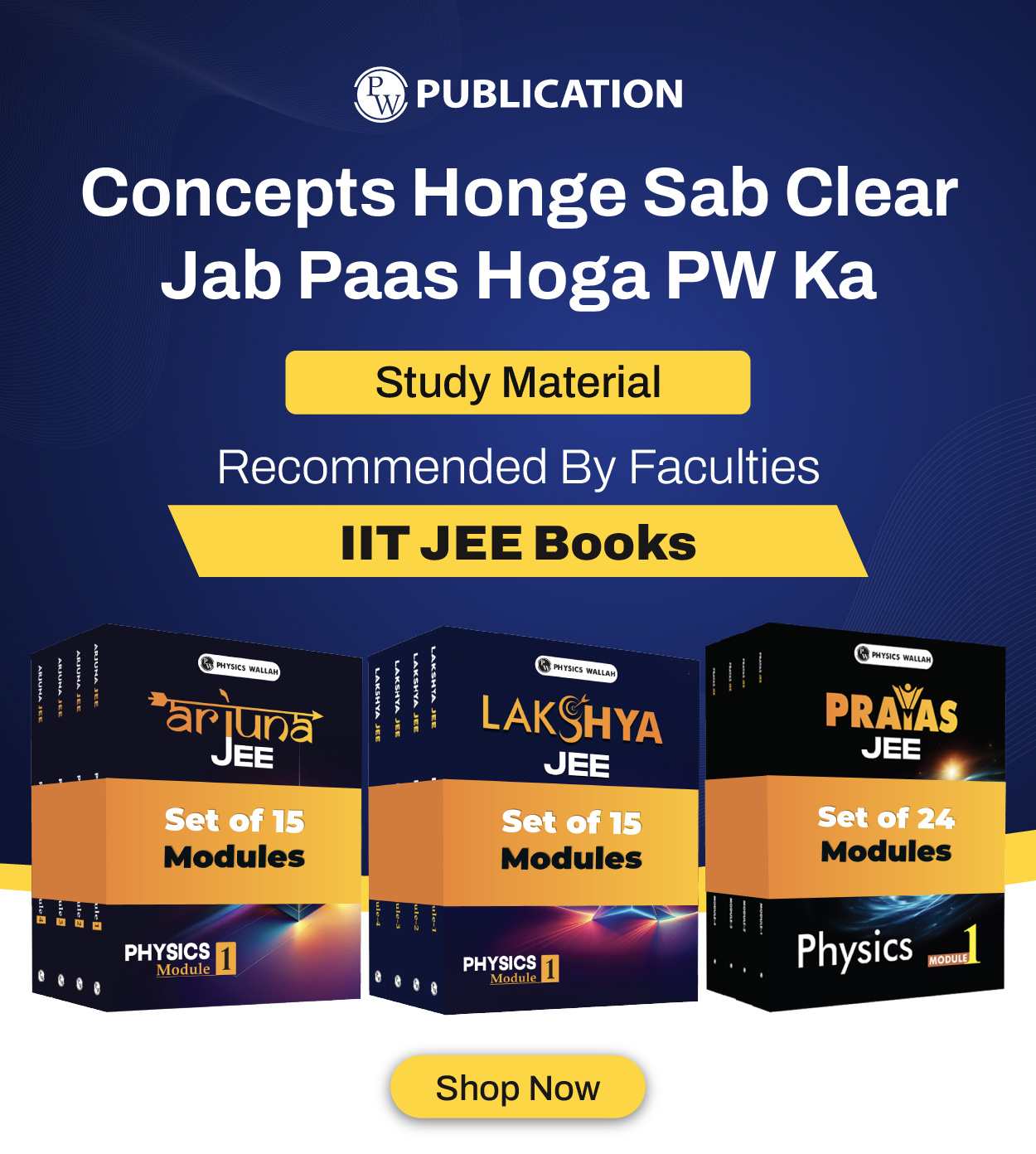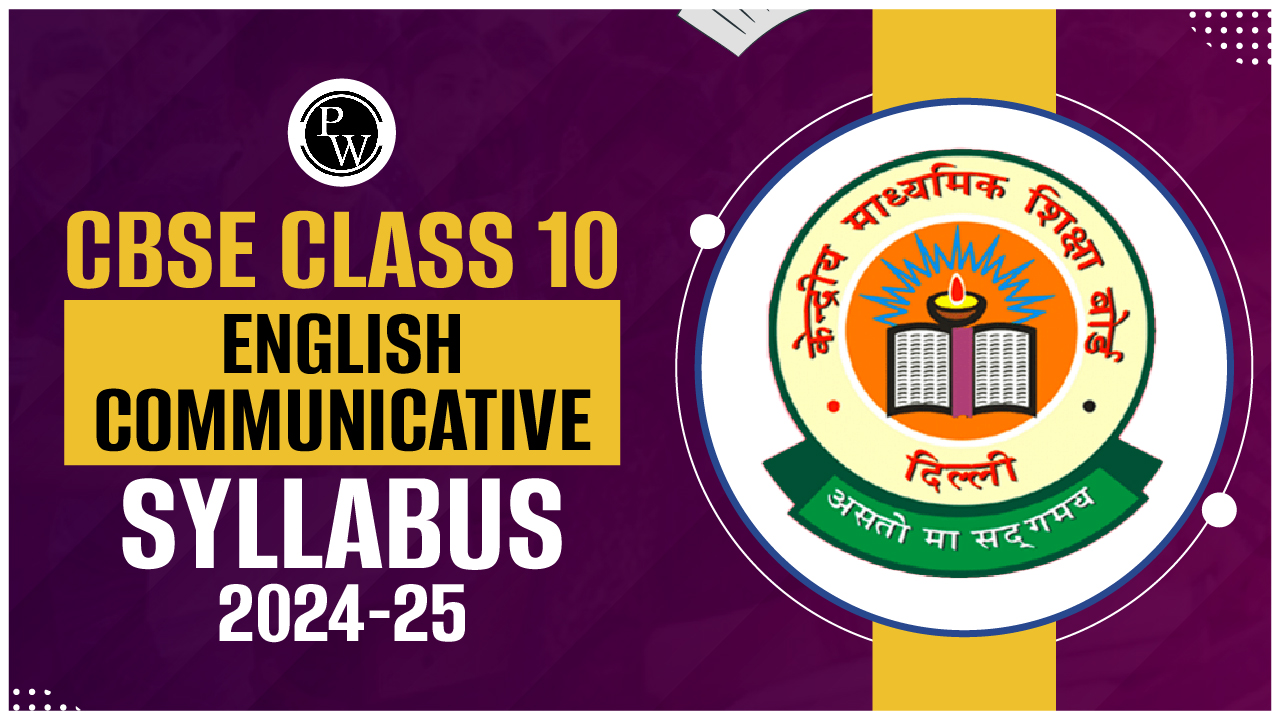JEE Important Questions Physics with Solutions

JEE Important Questions Physics with Solutions: Preparing for the Joint Entrance Examination (JEE) is one of the most important steps for students aiming to get into prestigious engineering institutes like the IITs, NITs, and IIITs. This national-level exam is conducted in two stages, JEE Main and JEE Advanced, and tests students’ understanding across three major subjects: Physics, Chemistry, and Mathematics.
Among these, Physics often appears the most challenging, as it combines theoretical concepts with numerical problem-solving. However, with consistent practice and the right resources, Physics can actually become one of the most scoring subjects in JEE.
To support your preparation, PW (Physics Wallah) has compiled a reliable set of JEE Important Questions Physics with Solutions. Whether you are targeting JEE Mains Physics Important Questions or JEE Advanced Physics Important Questions, this set has been carefully designed by subject experts to match the latest exam trends and question patterns.
It also includes handpicked JEE Physics PYQ (Previous Year Questions) to help you understand how questions are framed and what topics are frequently repeated. These solved questions not only help in strengthening core concepts but also improve your speed and accuracy, both essential for cracking the JEE. Go through the article below to get JEE Important Questions Physics with Solutions.
Check Out: JEE Books
JEE Main Physics Important Questions
1. A train starting from rest first accelerates uniformly up to a speed of 80 km/h for time t, then it moves with a constant speed for time 3t. The average speed of the train for this duration of journey will be (in km/h):
(a) 80 (b) 70 (c) 30 (d) 40
2. A particle moving in a straight line covers half the distance with speed 6 m/s. The other half is covered in two equal time intervals with speeds 9 m/s and 15 m/s respectively. The average speed of the particle during the motion is:
(a) 8.8 m/s (b) 10 m/s (c) 9.2 m/s (d) 8 m/s
3. A bullet is fired into a fixed target loses one third of its velocity after travelling 4 cm.
It penetrates further 𝐷×10 to the power 2 m before coming to rest.
The value of D is:
(a) 2 (b) 5 (c) 3 (d) 4
For more important questions, check the link below.
JEE Main Important Questions Physics with Solutions
Physics in JEE Main can feel tricky at first, but with the right approach, it can become easy. The JEE Mains Physics Important Questions are based on NCERT concepts and commonly asked topics like Kinematics, Laws of Motion, Work, Energy & Power, and Modern Physics. The question pattern includes MCQs and numerical value-type questions, with a marking scheme of +4 for correct answers and -1 for incorrect ones in MCQs. Solving these questions improves your problem-solving speed and builds accuracy.
To give you a good start, we’ve collected a list of high-quality JEE Mains Physics Important Questions with Solutions, designed to match the latest exam trends. It also includes JEE Mains Physics PYQ (Previous Year Questions), helping you identify frequently repeated concepts and patterns. Click the link below to download and start practising now.
JEE Important Questions Physics with Solutions
Check for More such Question: JEE Main Physics Important Questions
How to Use JEE Main Important Questions Physics with Solutions?
If you're preparing for JEE Main, you already know that time and smart strategy are just as important as hard work. Practising from JEE Mains Physics Important Questions with Solutions helps you focus on what really matters and saves time by cutting through unnecessary material. Here’s how to make the most of them:
1. Start After Understanding NCERT Concepts
Before jumping into important questions, you should have a clear understanding of the NCERT syllabus. NCERT forms the base of most questions asked in JEE Main.
-
Read each chapter carefully from the NCERT textbook
-
Focus on understanding the key definitions, formulas, and derivations
-
Once confident, move on to important questions related to those topics
2. Practice Chapter-Wise Questions
Solving questions topic by topic will help you stay organised and track your progress better.
-
Choose one chapter and complete all related important questions
-
Use JEE Mains PYQ to see how those concepts appeared in past exams
3. Identify Frequently Asked Concepts
Certain topics appear more often in the JEE Main exam. You should note them and revise them more frequently.
-
Observe which formulas and theories repeat across years
-
Highlight those topics in your notes
-
Create a revision list of such important areas
4. Study the Solutions Carefully
The way a question is solved is just as important as the answer. Use the provided solutions to improve your method.
-
Check how each step is explained
-
Learn tricks and shortcuts used in solving
-
Compare your approach with the solution to find better methods
5. Solve with a Timer for Speed Practice
Since time is limited during the actual exam, it’s important to practise solving questions within a time limit.
-
Use a stopwatch or timer while solving sets of questions
-
Try to complete each set within the exam-style time
-
Note how much time you take per question and work on improving it
Check Out: JEE Previous Year Papers
JEE Advanced Important Question
1. The pairs of physical quantities that have the same dimensions is (are): (IIT-JEE 1995)
(a) Reynolds number and coefficient of friction
(b) Curie and frequency of a light wave
(c) Latent heat and gravitational potential
(d) Planck’s constant and torque
2. The dimensions of the quantities in one (or more) of the following pairs are the same. Identify the pair(s): (IIT-JEE 1986)
(a) Torque and work
(b) Angular momentum and work
(c) Energy and Young’s modulus
(d) Light year and wavelength
3. Consider a vernier caliper in which each 1 cm on the main scale is divided into 8 equal divisions and a screw gauge with 100 divisions on its circular scale.
In the vernier caliper, 5 divisions of the vernier scale coincide with 4 divisions on the main scale and in the screw gauge, one complete rotation of the circular scale moves it by two divisions on the linear scale. Then
(a) If the pitch of the screw gauge is twice the least count of the vernier caliper, the least count of the screw gauge is 0.01 mm
(b) If the pitch of the screw gauge is twice the least count of the vernier caliper, the least count of the screw gauge is 0.05 mm
(c) If the least count of the linear scale of the screw gauge is twice the least count of the vernier caliper, the least count of the screw gauge is 0.01 mm
(d) If the least count of the linear scale of the screw gauge is twice the least count of the vernier caliper, the least count of the screw gauge is 0.005 mm
Click the link below to get more JEE Advanced Questions.
JEE Advanced Important Questions Physics with Solutions
When it comes to JEE Advanced, Physics becomes more application-based and conceptually intense. The JEE Advanced Physics Important Questions test your ability to apply principles across integrated topics like Electrodynamics, Mechanics, Optics, and Modern Physics.
The exam includes a variety of question types, single and multiple correct options, matrix match, paragraph-based questions, and numerical value types. The marking scheme is dynamic, with both full and partial marking, and negative marking depending on the question type. Click the link below to download these resources and upgrade your preparation.
JEE Advanced Important Questions Physics with Solutions
Check for More such Question: JEE Advanced Physics Important Questions
How to Use JEE Advanced Important Questions Physics with Solutions?
JEE Advanced questions are known for testing deep understanding and logical thinking. The Physics section is filled with tricky and concept-based questions that often combine two or more chapters. Here’s how you can prepare effectively:
1. Focus on Concept Integration
In JEE Advanced, many questions link concepts from different chapters. Understanding how to apply multiple ideas at once is key.
-
Practice problems that involve two or more topics
-
Use JEE Advanced Physics Important Questions that test combined concepts
-
Develop the ability to switch between concepts quickly during problem-solving
2. Learn Step-by-Step Problem Solving
Solutions to JEE Advanced questions often involve multiple stages of thought. Analysing these will help you build logical thinking.
-
Read the full solution, not just the final answer
-
Break down how the problem was approached
-
Understand the reason behind each step taken
3. Use JEE Advance Previous Year Questions Paper
Looking at JEE Advanced Physics PYQ gives you an idea of the paper’s nature, pattern, and important concepts.
-
Practice questions from the JEE Adavanced Previoua year paper
-
Mark the topics that appear repeatedly
-
Revise those topics with more focus
4. Solve All Types of Question Formats
JEE Advanced includes a variety of question formats. Being comfortable with each one helps you manage time better.
-
Practice matrix match, numerical type, and paragraph-based questions
-
Understand the marking scheme for each type
-
Review examples from JEE Advanced Physics PYQ with solutions
5. Revise and Track Your Mistakes
Revision plays a key role in JEE Advanced prep. You also need to track your errors so you don’t repeat them in the actual exam.
-
Maintain an error notebook with questions you got wrong
-
Revisit those questions regularly and understand your mistakes
-
Keep a formula sheet and review it often during the final revision
Read More: List of Physics Formulas for JEE Exams
JEE Physics Important Question FAQs
1. What are the most important chapters in Physics for JEE Main?
Some of the most important chapters include Laws of Motion, Work, Power and Energy, Current Electricity, Modern Physics, and Thermodynamics.
2. Are JEE Physics PYQ enough for revision?
JEE Physics PYQ (Previous Year Questions) are great for revision, especially when paired with concept-based study.
3. How are JEE Mains Physics PYQ different from JEE Advanced Physics PYQ different?
JEE Mains Physics PYQ are more direct and NCERT-based, while JEE Advanced Physics PYQ require a deeper understanding and multi-concept application.
4. Where can I find JEE Mains Physics Important Questions with Solutions?
You can access them on trusted platforms like PW (Physics Wallah), which provides chapter-wise important questions with detailed solutions.
5. How many questions should I practise per chapter for JEE Main Physics?
Aim for at least 50 to 80 good-quality questions per chapter, including conceptual and numerical types from JEE Mains Physics Important Questions and PYQs.











